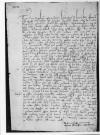Tua in me et ⌊Gallorum regis⌋ ⌊oratorem⌋ humanitas et benevolentia effecerunt, Praesul egregie, ut negotiis etsi Sysipheis saepenumero obruti, numquam ita nobis temperare poterimus, quin in omni congressu, confabulationibus, repotiisque mediis Dantisci nostri recordemur, et poculis absentem, ut praesentem salutemus, subinde ultro citroque iactitantes, leges illas conviviales a te nobis praescriptas. Attamen, cum multarum rerum nemo vel me neglegentior sit vel magis incurius, nescio, an a quovis etsi ⌊Sileno⌋ in hac re vinci possim. Inter omnes tamen deos ⌊Bacchus⌋ ille vel Nymphatus displicet, sed naturae meae oleas terminosque excedere coactus sum et a poculis aegrotum imitari quem Eleides corripuerunt, tanta est in Dantiscum animi promptitudo.
Sed quid amicum in symposiis abesse queror? Et non in arduis occupationibus magis summeque necessariis? In tuum enim gremium effundere solemus quicquid obveniebat negotii, quicquid curarum, quicquid denique sollicitudinis. Nunc vero quem appellemus, an ignotos, Thersites? An plena rimarum dolia? O, tuum infelicem discessum, regisque Poloniae arbitrium, quo nobis tantum consulem ademit. Optarem ego vel caduceo suo tunc illi ⌊Mercurius⌋ somnium incussisset, aut occupassent (et id iniuria) ⌊Furiae⌋, attamen ille est, fateor, cuius observes nutum et ex quo totus pendeas.
Sed in eam fortunam te incidisse, usque plus satis ferimus. Habes, Praesul dignissime, quis nos scrupulus torqueat, propemodum (vel ipsa salute volente immedicabilis) nisi propediem speraremus in ⌊Cracoviam⌋ nos advolaturos, quo iam ut fide pepigimus promisso nos exsolvissemus . Verum consilium mutare coegit repentinus (et ut fieri solet) insperatus ⌊caesaris⌋ discessus. Interim est, quod animos nostros, in calceis fere nunc resides restituat, nempe tuus in aulam reditus, quo vellem beneficio nos sibi Iuppiter devinciret, quamvis praeter otium Dantisco nihil placere arbitremur, aulae iam assueto, nobiliumque consuetudini.
Si tamen id doni dii nobis inviderint, exspectabis tuum ad suum Dantiscum ex ⌊Anglia⌋ advolantem Cranmerum, molestias, nugas, ipsum tandem garritum, nec enim solum, verum ⌊Eliota⌋ comitatum, qui nusquam tui non meminerit, putarem (nisi amicus esses) arcem te quampiam exscripsisse, ita animos nostros tecum in ⌊Polonia⌋ suspensos detines.
Salutant te orator Galliae, Senensis, Mantuae, ceterique amiculi omnes. Tuus, ne dicam meus, ⌊Georgius⌋ ex morbo non mediocri convaluit, mallem illum in ⌊Polonia⌋ vitam agere securius, quam nobiscum tantorum laborum participem. Verum curabimus minus quam alii itineris molestiam sentiat de rebus hic gestis baiulum consules.
Vale tui Cranmeri memor.

